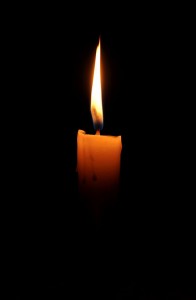This is one of the few proverbs that I have few, if any, reservations about, because it seems to apply to pretty much all conditions. There’s lots of darkness about – ignorance, dogmatism, hatred, prejudice – and it’s very tempting to merely curse it. If, like me, you’re of a critical disposition and can easily see problems and false assumptions in almost any position, it’s especially easy just to sit there in the dark criticising on all sides and working up anger and hatred in the process. Yet lighting a candle takes a moment of awareness and creativity. It demands that we consider the sphere in which we can act rather than remaining fixated only on the wider sphere of concern. If we have criticisms, it requires that we also think about the positive alternatives we have to offer.
Starting the Middle Way Society (which has been going since 2013) is one attempt to light a candle. Before that, I was developing Middle Way Philosophy, seeing problems in one absolute position and then another on all sides, convinced that the Middle Way was the best practical option, but unable to offer much as an alternative to the positions I criticised. Being able to offer something positive, in which philosophy is clearly and inextricably linked to practice and supported by a developing community, feels more and more valuable. Even if it turns out that the candle is blown out by a gale, I’ll be glad that I lit it.
The current political situation might also provide a important application of this proverb. Personally, I have found the election of Donald Trump in the US and the Brexit vote in the UK (and now the calling of an opportunistic election in the UK) a time of considerable political darkness. Nor am I sure, at present, of any realistic political action I can take that will make any difference. The best way I can light a candle, it seems, is to carry on doing what I’m doing, developing and offering the Middle Way, in the hope that this will have a small but positive effect on political life.
Are there any occasions when it is better to curse the darkness instead? One might imagine circumstances where lighting any kind of candle was impossible, because of living in a highly repressive society for example. I can understand people being afraid to light candles in places like North Korea or Saudi Arabia. Even in a politically more open country, you might feel yourself to be trapped in circumstances that snuff out all candles – in a highly frustrating and exploitative job for example. But even in these kinds of circumstances, merely cursing achieves nothing except creating conflict. However much you may hate your rulers and however dark it may be, it seems better to sit with awareness in the darkness and to think about creative ways forward, than it is to merely curse.
Link to index of other posts in the ‘proverbs’ series
Photo by Paolo Costa Baldi, GFDL/CCBYSA 3.0

Robert M Ellis is a pretty narrow man. How about reading and TRULY understanding this:
Like a muddied spring or a polluted fountain is a righteous man who gives way before the wicked.
This is from the Bible. What kind of Christian are you?
While Eleanor Roosevelt is widely credited for this quote, I’m unable to find “Better to light a candle than to curse the darkness” in Proverbs 4 as the author suggest in the title of this article.
This is the fourth in a series of blogs about proverbs – in the wider sense of sayings used by people, not in the specific sense of the book of that name in the Hebrew Bible!
Adlai Stevenson, in his eulogy of Eleanor Roosevelt, said, “…she would rather light candles than curse the darkness and her glow had warmed the world.” The quote is not found in Proverbs 4 in several translations I checked. But I listened to Stevenson’s eulogy as a child. These words have remained with me. I remember thinking what a wonderful way to live.
Once again, see my comment above. ‘Proverbs 4’ means the fourth in a series of blogs about proverbs, not the fourth chapter of the Biblical book.
This isn’t in Proverbs 4 at all.
Per Wikipedia:
Often claimed to be an ancient Chinese proverb. Also often misattributed to Eleanor Roosevelt.
Earliest known usage is a 1907 sermon by English preacher William Lonsdale Watkinson
Per Quote Investigator: The earliest appearance located by QI occurred in a 1907 collection titled “The Supreme Conquest and Other Sermons Preached in America” by William L. Watkinson.
Please read the response already given above to someone else who similarly misunderstood the title.
I’ve heard it related to Toc H and the early Boy Scouts too but that doesn’t appear with a google search.
Lovely to see Adlai Stevenson cited, however correctly. An enduring hero for civilised people the world over (for instance Australia, I wish to think).